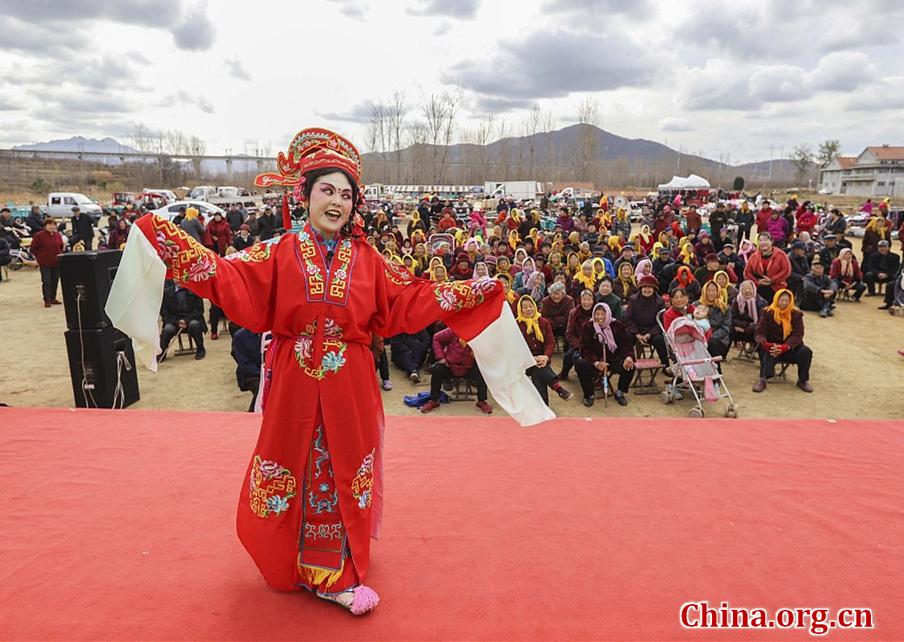CPPCC members propose rural vitalization in culture
- By Zhang Rui
 0 Comment(s)
0 Comment(s) Print
Print E-mail China.org.cn, March 10, 2021
E-mail China.org.cn, March 10, 2021
Multiple national political advisors stressed that vitalization in culture should also be a major focus of rural vitalization and proposed various ways in which to do so.

Zhang Kaili, a member of the 13th National Committee of the Chinese People's Political Consultative Conference (CPPCC) and veteran actress, said that in the process of poverty alleviation, all sectors have played to their professional advantages and that cultural poverty alleviation is also a necessary step in improving wealth.
"For many years, I have worked with many cultural and artistic workers on the frontline of cultural poverty alleviation, people who have shouldered their due responsibility in the mission of poverty alleviation in poorer areas. We can also help them in aspects of cultural and spiritual cultivation," Zhang said.
But rural vitalization cannot only operate at the material level. As Zongyong Zhuoma, a national political advisor and famous Tibetan soprano pointed out, an overall change in spiritual outlook is also particularly important. In her proposal for this year's annual session of China's top political advisory body, she appealed for support for the production of an original poverty alleviation musical inspired by rural people in Yunnan province.
"Literature and the arts are food for the spirit and an important part of culture that can touch human souls. We need to build a strong rural cultural platform so that good cultural works can be continuously injected into rural areas. This will be a particularly important task for rural vitalization," she said.
Zhang agreed, saying that cultural vitalization is the internal driving force and basic foundation for quality rural vitalization. She suggested that the newly-founded national administration for rural vitalization should establish a special department and jobs to provide an institutional system guarantee for rural vitalization in culture, as well as promote the work of artists — especially the younger generation — relevant workers and private cultural enterprises to join the cause and cater to the diverse cultural needs of rural people.
Also grassroots cultural departments should explore local cultures, rural cultural tourism, and quicken rural cultural infrastructure construction, Zhang added.
Building rural libraries is one of the things to prioritize, said Lei Mingqiang, a member of the National Committee of the CPPCC and president of the Hunan Institute of Socialism.
"There are more and more public welfare libraries established by social entities in rural areas, which have become a useful supplement to the infrastructure on the front of rural public cultural vitalization and an important part in the construction of a rural public cultural service system," he said. "These projects are providing public cultural services to meet the growing spiritual and cultural needs of the rural people."
Lei suggested various methods in which to support private-funded public welfare libraries, such as issuing subsidies and improving libraries' overall operations, management, and approval procedures.
Political advisor Tian Jing is concerned that in rural areas mostly populated by ethnic minorities, schools don't have suitable intangible cultural heritage courses to teach students folk and traditional handcraft skills.
"Integrating traditional skills with the cultural tourism industry not only effectively enhances the visibility of intangible cultural heritage and consolidates the foundation for the local inheritance of traditional skills, but also solves problems relating to employment and entrepreneurship among local youth and allows the cultural industry to help rural vitalization," Tian explained.

Literature and the arts can play an even more important role as China enters the stage of rural vitalization, said Fan Di'an, a national political advisor and chairman of the China Artists Association and dean of the Central Academy of Fine Arts, in an interview at the Great Hall of the People in Beijing on March 4.
"The villages are steeped in the knowledge and traditions of ethnic handicrafts and intangible cultural heritage, which needs to be enlivened to facilitate the vitalization of rural cultural industries," he said.






Go to Forum >>0 Comment(s)